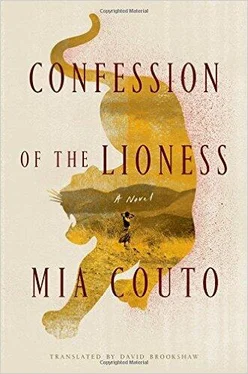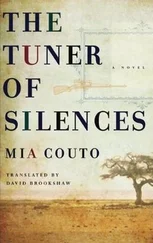We stood in silence as my eyes lingered over the waters of the Lideia. Tired of waiting, Archie asked the name of the river. He said that he was coming to hunt a savage crocodile that was spreading terror in the area. He wasn’t going to do anything without knowing the river’s name.
I sighed. The visitor didn’t want to know my name. Only the landscape seemed to interest him.
Lundi Lideia, that’s its full name , I replied begrudgingly. But we just call it the Lideia.
So what does it mean?
Lideia is the name we give to a type of dove.
A dove? Archie pondered. Then he laughed, finding a joke where I could see none.
Fair enough! There are rivers that make us fly.
Those were the hunter’s words. We said goodbye while looking at the river, that same river that I’m now using to get away from Kulumani, to escape from my family, and break out of my own life.
* * *
When, in the early hours, I threw myself into this journey, it was my intention to warn the hunter of the ambush that was being mounted against him. My plan was straightforward: I would jump out of the skiff by the bridge and set off down the highway, where I would wait for the visitors. Sixteen years ago, Archie had saved me from the threat of a lewd policeman. This time, I’d be the one to save him. And I could see myself standing in the middle of the road, my arms waving like flags fluttering. Who knows, maybe the hunter would take me in his arms and bear me aloft in giddy flight.
But while I am carried down the river, another sentiment takes hold of me. I’m not going to meet the hunter. Rather, I’m fleeing from him. Why am I running away from the only person who might have loved me? I don’t know how to answer. My mother often says that water makes the stones round in the same way that women shape the souls of men. It could have been like that with me. But it wasn’t. There was no love, no man, no soul. What happened was that with the passing of time, I lost all hope. And when someone stops having hopes, it’s because they’ve stopped living. So that’s why I’m running away: I fear being devoured. Not by the anxiety that dwells deep within me. Devoured by the emptiness of not loving. Devoured by the desire to be loved.
* * *
The skiff arrives, at last, at a pool of clear water. This pool is considered a sacred spot, which only witch doctors dare visit. In the village, it is said that it’s here that the water makes its nest. The older folk call this place lyali wakati , the “egg of time.” The peace and quiet of this paradise ought to mollify me, but it doesn’t. Because I realize that the skiff is stuck, and despite all my efforts, I can’t move on. There’s no sign of a current, no sign of an eddy. But the skiff is stuck fast on the bed of the River Lideia. It must be fulfilling the age-old rule: Small places have a wide reach. No matter how hard we try to leave, we never get away. What a cursed land, so devoid of sky that we even have to exhume the clouds , was what Grandfather Adjiru would complain. And that’s how I now execrate my native land.
A tremor shakes me, my heart leaps up through my throat when, standing up in my unsteady skiff, I sense a hidden presence on the riverbank. Although I’m a woman, I have inherited the hunter’s instinct that runs through my family. I know of shadows that move among shadows, I know of smells and signs that no one else knows about. And now I’m certain: There’s an animal on the riverbank! There’s a creature creeping furtively through the foliage next to the water.
And suddenly, there it is: a lioness! She’s come down to drink from the calm water on that part of the riverbank. She contemplates me without fear or excitement. As if she had been waiting for me for a long time, she raises her head and pierces me with her inquisitive gaze. There is no tension in her behavior. It might be said that she recognizes me. More than this: The lioness greets me with a sisterly respect. We linger in this mutual contemplation and, gradually, a sense of spiritual harmony takes hold of me.
Having slaked her thirst, the lioness stretches as if she wanted a second body to emerge from her own. Then she slowly withdraws, her tail swaying like a furry pendulum, each step caressing the earth’s surface. I smile with uncontained pride. They are all convinced that it is male lions who are threatening the village. It’s not. It’s this lioness, delicate and feminine as a dancer, majestic and sublime as a goddess, it’s this lioness that has spread such terror through the neighborhood. Powerful men, warriors equipped with sophisticated weapons: All of them have prostrated themselves, enslaved by fear, vanquished by their own impotence.
Once again, the lioness fixes her gaze upon me, and then turns in a circle before disappearing. Something that I shall never be able to describe suddenly robs me of my good judgment and a shout bursts from my breast:
Sister! My sister!
In despair, my fists grasp the oars in an attempt to propel the skiff toward the shore:
Silência! Uminha! Igualita!
The names of my dead sisters reverberate through that mysterious setting. I shiver from head to foot: I had just challenged the sacred precepts that forbade me from uttering the names of the dead. Attracted by their summons, the deceased may reappear in the world. Perhaps that was my secret wish. A desperate urge causes me to disobey the rule once more:
It’s me, sister, it’s me, Mariamar!
I then realize how absurd my situation is: I, who had never raised my voice, was now shouting for someone who could not hear. They’re right, the people who point a finger at me: I’m mad, I’ve lost control of myself. And I burst into tears, as if I were suddenly aware of how little I cried when I was born. Adjiru was right: Sadness isn’t crying. Sadness is having no one to cry for.
Don’t leave me, please, take me with you.
The call echoes through the forest, and for a second I seem to hear other voices clamoring for Silência. But the vegetation closes in on itself, thick and unmoving. In the place where the lioness has just drunk, there’s now a red stain rapidly spreading across the surface of the water. Suddenly the whole river has turned red, and I am drifting in blood. The same blood that, every time I dreamed of giving birth, would flow out between my thighs, the same blood that is now flowing in the current. My grandfather, Adjiru Kapitamoro, was right: This river was born from his hands, just as I was born from his attachment to me. And at this point, I understand: More than the land, my prison was my grandfather Adjiru. It was he who had brought the skiff to a standstill and held me back in the Lideia’s sacred pool.
Grandfather , I plead. Please let me continue downstream.
I curl up in the bottom of the skiff, I lie there seeking the sleep of those who are not yet born. Then, all of a sudden, another skiff penetrates the silence and, to my alarm, approaches me like some furtive crocodile. It can only be Adjiru coming to rescue me. With a tight throat, I call out:
Grandfather?
The two craft are now alongside each other and a figure leans over me to tie a rope round the oarlocks of my boat. The light is behind this intruder, and all I can see is a dark silhouette. Not wanting to waste time, I point to the shore and declare:
She was there! The lioness was there. Let’s follow her, Grandfather, she can’t have got far.
Sit up, Mariamar.
I am startled: It’s not Adjiru. It’s Maliqueto Próprio, the village’s solitary hangman. Without uttering a word, he starts dragging me back toward Kulumani. Halfway, he ships his oars and stares fixedly at me until the abandoned boat begins to glide away downstream at the whim of the current.
Читать дальше












